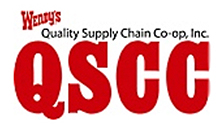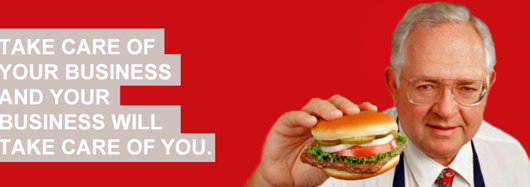… if anything, it’s even less independent. And, more importantly, it’s still not even close to a substitute for real social responsibility.
In a television report on last weekend’s Wendy’s protests in New York City, Wendy’s spokesperson Bob Bertini said the following in defense of the company’s refusal to participate in the Fair Food Program:
“… ‘Wendy’s is a member of an independent, non-profit cooperative that purchases all food supplies for our restaurants. All suppliers are required by contract to operate in a way that is safe and lawful for their workers. We believe this is important and the right thing to do.'” — Bob Bertini, Spokesperson for Wendy’s
In our post responding to Mr. Bertini’s claim, we incorrectly identified that purchasing cooperative as the Strategic Sourcing Group (SSG). As it turns out, the SSG was a purchasing coop that pooled the buying power of Wendy’s and Arby’s for a brief, shining moment. Today, however, the “independent, non-profit cooperative that purchases all food supplies” for Wendy’s restaurant is in fact the Quality Supply Chain Coop (QSCC).
For those of you who are interested in this sort of thing, here are the explanatory paragraphs from the “History” page of the QSSC website (which is also where we found the photo at the top of this post, featuring Wendy’s founder Dave Thomas and a juicy red tomato slice):
Second Co-op Formed Then Dissolved, Wendy’s Functions Absorbed Into QSCC
QSCC reached an agreement in 2010 with WAG and ARCOP, Arby’s supply chain cooperative, to form the Strategic Sourcing Group Co-op. SSG developed and managed programs for capital assets, contract services, energy, equipment, and smallwares for both the Wendy’s and Arby’s brands.In 2011, WAG approved the sale of the Arby’s brand and SSG was dissolved. QSCC’s Board approved adding management of SSG’s product and service programs on behalf of the Wendy’s system into our co-op effective May 2.
So, in short, in 2010, Wendy’s and Arby’s formed the SSG. In 2011, Wendy’s sold Arby’s, and shortly thereafter, SSG was dissolved and its functions absorbed into the QSCC.
Why are we bothering you with all this?
You might be saying “whatever” right about now and wondering just what we are getting on about, but stick with us, there are several reasons why we wanted to make this particular correction:
- First, because we are a farmworker organization, not a multi-billion dollar corporation, and our credibility is our only currency. While, in our experience, many corporations have shown a remarkably cavalier attitude toward the truth (we’re looking at you, Publix…), If we make a mistake, no matter how inconsequential, we will correct it.
 Second, because, if anything, the QSSC appears even less “independent” than we had originally thought (the image on the right, from their website, speaks louder than all of Mr. Bertini’s words). From the photo of Dave Thomas on its home page, to the content of its“Who We Are” and “History of QSCC” pages, QSCC leaves little doubt about its intimate connection to Wendy’s. Here are just a few quotes from those pages, you be the judge:
Second, because, if anything, the QSSC appears even less “independent” than we had originally thought (the image on the right, from their website, speaks louder than all of Mr. Bertini’s words). From the photo of Dave Thomas on its home page, to the content of its“Who We Are” and “History of QSCC” pages, QSCC leaves little doubt about its intimate connection to Wendy’s. Here are just a few quotes from those pages, you be the judge:
- “Quality Supply Chain Co-op, Inc. is honored to be part of the Wendy’s® extended family…”
- “Wendy’s and Wendy’s Restaurants of Canada Inc. (WROC) establish and enforce product and service specifications as the quality assurance gate keepers for QSCC. Wendy’s and WROC also approve authorized suppliers and distributors.”
- “QSCC oversees the Wendy’s supply chain and manages a wide range of supporting programs to ensure that all Wendy’s restaurants in North America have everything they need delivered right to their door.”
So, it seems that while the SSG combined the purchasing power of Wendy’s and Arby’s restaurants, the QSSC actually focuses on serving the supply chain needs of Wendy’s restaurants, and Wendy’s calls the shots, down to establishing product specifications and approving authorized suppliers.
- And third, because we wanted another reason to discuss the role of purchasing co-ops in the food industry as a whole and just how absurd it is for Wendy’s to point to its “independent, non-profit purchasing cooperative” as some sort of meaningful alternative to the Fair Food Program. So here we go…
Purchasing Coop + Hollow, Unenforced Code of Conduct = Recipe for Abuse in the Supply Chain
Wendy’s is hardly alone in forming a purchasing coop to manage its supply chain needs. According to its own website, QSSC is only “the third-largest co-op in the food service industry, with $3 billion in buying power.”
So, why do restaurant companies form purchasing co-ops in the first place? Let’s ask them:
- Wendy’s: QSSC enables “us to provide more favorable pricing and improved distribution service levels to our members.”
- Subway (Independent Purchasing Cooperative): “IPC’s primary role is to negotiate the lowest cost for purchased goods and services, including food, produce, packaging items and equipment.”
- Yum Brands (Unified Foodservice Purchasing Coop): “Our Mission: Provide our members with an assured supply of specified products at the lowest cost.”
“Provide more favorable pricing.” “Negotiate the lowest cost.” “Provide… the lowest cost.” Seeing a theme here?
Purchasing cooperatives — be they owned by billion-dollar corporations or dirt-poor peasants — allow their members to pool their buying power to negotiate the lowest possible prices for the things they buy together. Purchasing cooperatives, in and of themselves, are neither moral nor immoral, they are nothing more than a mechanical reality of the marketplace. Intrinsically, they are amoral.
 They can, however, produce immoral outcomes, like farmworker poverty. And in the food industry, purchasing cooperatives have, beyond a shadow of a doubt, contributed to farmworker poverty for decades. When wielded by companies that combine the buying power of tens of thousands of restaurants, purchasing cooperatives allow their members to demand impossibly low prices for the lettuce, pickles, and tomatoes they sell on their sandwiches. Those prices are made possible, in part, by the sub-poverty wages paid to farmworkers for generations.
They can, however, produce immoral outcomes, like farmworker poverty. And in the food industry, purchasing cooperatives have, beyond a shadow of a doubt, contributed to farmworker poverty for decades. When wielded by companies that combine the buying power of tens of thousands of restaurants, purchasing cooperatives allow their members to demand impossibly low prices for the lettuce, pickles, and tomatoes they sell on their sandwiches. Those prices are made possible, in part, by the sub-poverty wages paid to farmworkers for generations.
That is why it is to their credit that companies like Yum Brands and Subway — and every multi-billion dollar food company that has joined the Fair Food Program — have taken steps to mitigate the impact of their purchasing strategies. By adding a penny-per-pound to the price of tomatoes they buy from Florida, they are actually reversing the impact of their volume purchasing and improving the lives of Florida’s farmworkers in real, measurable ways. Through the Fair Food Program, participating companies will have paid over $10 million since January of 2011 to help increase farmworkers’ incomes, and their commitment to buy Florida tomatoes only from participating growers has turned their immense purchasing power into a tool to eliminate human rights abuses in the fields.
Wendy’s, on the other hand, seems content to continue profiting from farmworker poverty.
If Wendy’s is going to stand behind its “independent non-profit purchasing cooperative” to defend its decision to turn its back on the Fair Food Program, then we challenge Wendy’s to disclose not only its code of conduct, but the resources and processes the QSSC has in place to monitor and enforce that code. For years, companies like Wendy’s have hidden behind codes of conduct that went entirely, and shamelessly, unenforced. A code without resources and procedures adequate to enforce it isn’t even worth the paper its written on. Without enforcement, the code is nothing more than a public relations tool to protect the brand of the company that waves it in its own defense, not the rights of those the code pretends to protect.
When Wendy’s discloses those enforcement measures, only then we can start talking about whether it can be considered an alternative to the Fair Food Program.
The ball’s in your court, Wendy’s…

